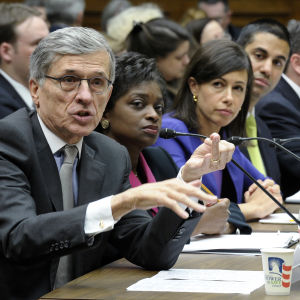Federal Communications Commissioners Ajit Pai and Tom Wheeler reprised their roles as political opponents on Capitol Hill Wednesday, where they debated the merits of the agency’s recently proposed privacy regulations for Internet service providers (ISPs) — rules Wheeler says will carry privacy into the digital age, but according to Pai, won’t actually protect consumer data.
“Most of us understand that the social media we join and the websites we visit collect our personal information, and use it for advertising purposes,” Wheeler told the Senate Judiciary Subcommittee Subcommittee on Privacy, Technology and the Law Wednesday. “Seldom, however, do we stop to realize that our ISP is also collecting information about us.”
In March the FCC chairman proposed new regulations to govern how ISPs handle user data, including limitations on when ISPs can share or sell user data — an effort aimed at giving customers more control over their privacy and security.
Wheeler framed the proposal for lawmakers as a natural extension of the FCC’s authority over telephone network’s customer information handling — jurisdiction that was expanded to cover ISPs when the FCC reclassified broadband providers as public utilities in its net neutrality rulemaking last year.
“When I made a phone call to order something, and then got on the mailing list of Hammacher Schlemmer, that was between me and Hammacher Schlemmer,” Wheeler said. “The network delivered me there without taking my information.”
Far from the power grab lamented by Republicans, Wheeler said the rules would bring ISPs closer to the same standards and reverse the communications market “retreat from privacy.”
“I go to WebMD and WebMD collects information on me,” he continued. “I go to Weather.com and Weather.com collects information on me. I go to Facebook and Facebook collects information on on me. But only one entity collects all of that information, that I’m going to all of those different sites, and can turn around and monetize it.”
Pai said the rules will do little to actually protect consumers’ privacy, since it’s not who holds their data that Americans care about, but rather how companies safeguard such data.
“The FCC’s actual proposal won’t give consumers any more control of their online privacy with respect to smartphone manufacturers or operating system designers or search engines or app developers or website owners or content providers,” Pai said. “But a more straightforward account of the proposal is hardly a compelling headline.”
Instead, he argued, the rules will disadvantage a sector of the online ecosystem that already has a limited view of consumer data compared to edge providers like Facebook and Google, both of which monetize user data via targeted advertising.
As one recent study by President Clinton’s chief counsel for privacy and President Obama’s special assistant for economic policy explained, ‘the 10 leading ad selling companies earn over 70 percent of online advertising dollars, and none of them has gained this position based on its role as an ISP,” Pai said citing a Georgia Tech study that found ISPs have an increasingly limited view on consumer behavior because of emerging technologies like encryption and habits like browsing the on multiple devices.
“Search engines log every query you enter. Social networks track every person you’ve met. Online video distributors know every show you’ve ever streamed. Online shopping sites record every book, every piece of furniture, and every medical device you browse, let alone purchase,” Pai said. “And yet the FCC only targets one corner of the marketplace.”
The Republican commissioner said picking favorites will unfairly disadvantage a sector of the online economy, and disproportionately affects “upstarts in the concentrated market for online advertising.”
“It makes little sense to give some companies greater leeway under the law than others when all may have access to the very same personal data.” Pai said. “Selectively burdening ISPs confers a windfall to those who are already winning big in the world of online advertising.”
Since announcing the proposal ISPs have encouraged the FCC the follow the Federal Trade Commission’s lead and use a case-by-case approach to enforcement over edge providers instead of hard and fast rules.
Federal Trade Commission Chairwoman Edith Ramirez testified the agency would review the FCC’s rules, but was noncommittal on whether the agency would back the rules.

